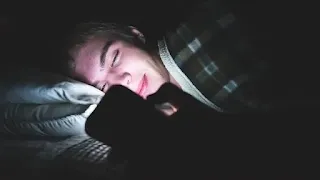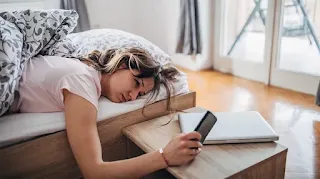A new study has revealed that YouTube negatively impacts teens' sleep. According to the study; Compared to Netflix or traditional television channels, YouTube reduces teens' getting enough sleep by 24 percent.
Researchers at Flinders University in Australia found that half an hour spent practicing under the duvet led to a 13-minute delay in falling asleep. The same research; When he examined a group of 700 young people aged 12 to 18 years, he suggested that those who watched television for the same amount of time before going to bed went to bed an average of nine minutes earlier.
The researchers said that YouTube, with its short videos, autoplay feature, and recommended videos, causes users to lose control, which negatively affects their sleep.
The study found that YouTube had a persistent and negative impact on teens' sleep patterns, compared to six other apps reviewed, including Instagram, Snapchat, and Spotify.
98 PERCENT SHOULD LOOK AT THE PHONE WHILE LIVING
The study was conducted in eight schools in Adelaide, South Australia. Researchers studied 711 teenagers aged 12 to 19 whose parents agreed to be included in the study. Teens reported how much time they spent in bed with devices and apps one hour before bedtime, and how long they slept during school days.
Each of the children provided information by estimating the time they spent on devices and apps. The results showed that each of them went to bed at around 10pm, turning off their lights at 10:36pm. According to the information given; It also took them about 30 minutes to fall asleep.
Almost every teen (98 percent) reported using at least one device, such as a phone, laptop, or television, an hour before bedtime, while three-quarters reported using it while lying down.
Among the devices used while lying down, the phone stood out with a usage rate of 98 percent, followed by laptops and television.
YOUTUBE CAUSES LESS SLEEPING
The analysis drew attention to the fact that YouTube is the third most popular app, used by half of young people signing in, but users spend more than 25 minutes lying on this platform.
Instagram, which stands out as the most popular application, was used for 17 minutes in bed, while Netflix was used about 17 minutes before bedtime.
At the end of the study, it was revealed that only YouTube negatively affects the sleep time of young people.

ENDLESS CONTENT IS AVAILABLE
The scientists called the results strange because, in theory, YouTube, Netflix, and television were seen as similar. Dr Meg Pillion and others, the psychologist who led the study, suggested in the study that this could be due to the nature of the devices:
“Both Netflix and television can be thought of as structured media where users decide to watch a particular program or movie with a clear beginning and ending. But YouTube is almost the opposite, the content is endless and personalized to the viewer by an algorithm that learns what they like to watch.”
7 IN 10 PEOPLE DO NOT SLEEP ENOUGH
The Centers for Disease Control and Prevention (CDC) says every teenager should get eight to 10 hours of sleep. But because they start to go to bed later and wake up later at this age, it's estimated that seven out of ten people don't get enough sleep.
Previous research had pointed to TikTok as one of the apps that should not be looked at right before going to sleep . In a survey of 2,000 people conducted by the sleep science and review platform Sleep Junkie, researchers found that 79 percent of TikTok users before bed said they felt tired throughout the day. However, TikTok, one of the most frequently used social media platforms by young people, was not included in the new study.





0 komentar:
Post a Comment